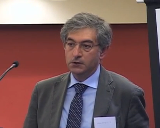Studiare
In questa sezione è possibile reperire le informazioni riguardanti l'organizzazione pratica del corso, lo svolgimento delle attività didattiche, le opportunità formative e i contatti utili durante tutto il percorso di studi, fino al conseguimento del titolo finale.
Calendario accademico
Il calendario accademico riporta le scadenze, gli adempimenti e i periodi rilevanti per la componente studentesca, personale docente e personale dell'Università. Sono inoltre indicate le festività e le chiusure ufficiali dell'Ateneo.
L’anno accademico inizia il 1° ottobre e termina il 30 settembre dell'anno successivo.
Calendario didattico
Il calendario didattico indica i periodi di svolgimento delle attività formative, di sessioni d'esami, di laurea e di chiusura per le festività.
| Periodo | Dal | Al |
|---|---|---|
| TERP 3A1S | 1-ott-2020 | 7-nov-2020 |
| TERP 2A1S | 5-ott-2020 | 2-dic-2020 |
| TERP 1A1S | 12-ott-2020 | 18-dic-2020 |
| TERP 3A2S | 8-feb-2021 | 12-mar-2021 |
| TERP 1A2S - 1 periodo | 8-feb-2021 | 5-mar-2021 |
| TERP 2A2S | 8-mar-2021 | 14-mag-2021 |
| TERP 1A2S - 2 periodo | 12-apr-2021 | 21-mag-2021 |
| Sessione | Dal | Al |
|---|---|---|
| TERP ROV SESSIONE INVERNALE 2 ANNO | 14-dic-2020 | 22-gen-2021 |
| TERP ROV SESSIONE INVERNALE 1-3 ANNO | 11-gen-2021 | 5-feb-2021 |
| TERP ROV SESSIONE ESTIVA 2 ANNO | 24-mag-2021 | 25-giu-2021 |
| TERP ROV SESSIONE ESTIVA 1 ANNO | 5-lug-2021 | 30-lug-2021 |
| TERP ROV SESSIONE ESTIVA 3 ANNO | 5-lug-2021 | 30-lug-2021 |
| TERP ROV SESSIONE AUTUNNALE | 1-set-2021 | 1-ott-2021 |
| Sessione | Dal | Al |
|---|---|---|
| TERP ROV SESSIONE AUTUNNALE | 1-nov-2021 | 31-dic-2021 |
| TERP ROV SESSIONE PRIMAVERILE | 1-mar-2022 | 30-apr-2022 |
| Periodo | Dal | Al |
|---|---|---|
| FESTIVITA' IMMACOLATA CONCEZIONE | 8-dic-2020 | 8-dic-2020 |
| Vacanze Natalizie | 24-dic-2020 | 3-gen-2021 |
| VACANZE PASQUALI | 2-apr-2021 | 5-apr-2021 |
| Santo Patrono | 5-ago-2021 | 5-ago-2021 |
| Vacanze Estive | 9-ago-2021 | 15-ago-2021 |
| Descrizione | Periodo | Dal | Al |
|---|---|---|---|
| TERP 3^ anno - 1^semestre | TERP 3^ anno - 1^semestre | 9-nov-2020 | 18-dic-2020 |
| TERP 2^ anno - 2^semestre (1 periodo) | TERP 2^ anno - 2^semestre (1 periodo) | 25-gen-2021 | 5-mar-2021 |
| TERP 1^ anno - 2^semestre (1 periodo) | TERP 1^ anno - 2^semestre (1 periodo) | 8-mar-2021 | 9-apr-2021 |
| TERP 3^ anno - 2^semestre (1 periodo) | TERP 3^ anno - 2^semestre (1 periodo) | 15-mar-2021 | 30-apr-2021 |
| TERP 3^ anno - 2^semestre (2 periodo) | TERP 3^ anno - 2^semestre (2 periodo) | 10-mag-2021 | 25-giu-2021 |
| TERP 1^ anno - 2^semestre (2periodo) | TERP 1^ anno - 2^semestre (2 periodo) | 24-mag-2021 | 25-giu-2021 |
| TERP 2^ anno - 2^semestre (2 periodo) | TERP 2^ anno - 2^semestre (2 periodo) | 28-giu-2021 | 30-lug-2021 |
| TERP 2^ anno - 2^semestre (3 periodo) | TERP 2^ anno - 2^semestre (3 periodo) | 30-ago-2021 | 1-ott-2021 |
Calendario esami
Gli appelli d'esame sono gestiti dalla Unità Operativa Segreteria Corsi di Studio Medicina.
Per consultazione e iscrizione agli appelli d'esame visita il sistema ESSE3.
Per problemi inerenti allo smarrimento della password di accesso ai servizi on-line si prega di rivolgersi al supporto informatico della Scuola o al servizio recupero credenziali
Per dubbi o domande leggi le risposte alle domande più frequenti F.A.Q. Iscrizione Esami
Docenti
 0464403434
0464403434
 loretta.berti@univr.it
loretta.berti@univr.it
 borghesi.a@mail.apss.tn.it
borghesi.a@mail.apss.tn.it
 silvia.chiesa@apss.tn.it
silvia.chiesa@apss.tn.it
 drgasp@tin.it
drgasp@tin.it
 enrica.latterini@apss.tn.it
enrica.latterini@apss.tn.it
 renata.lazzeri@apss.tn.it
renata.lazzeri@apss.tn.it
 anja.meyer@univr.it
anja.meyer@univr.it
 rocco.micciolo@economia.unitn.it
rocco.micciolo@economia.unitn.it
 antonio.nocera@univr.it
antonio.nocera@univr.it
Piano Didattico
Il piano didattico è l'elenco degli insegnamenti e delle altre attività formative che devono essere sostenute nel corso della propria carriera universitaria.
Selezionare il piano didattico in base all'anno accademico di iscrizione.
1° Anno
| Insegnamenti | Crediti | TAF | SSD |
|---|
2° Anno Attivato nell'A.A. 2021/2022
| Insegnamenti | Crediti | TAF | SSD |
|---|
3° Anno Attivato nell'A.A. 2022/2023
| Insegnamenti | Crediti | TAF | SSD |
|---|
| Insegnamenti | Crediti | TAF | SSD |
|---|
| Insegnamenti | Crediti | TAF | SSD |
|---|
| Insegnamenti | Crediti | TAF | SSD |
|---|
Legenda | Tipo Attività Formativa (TAF)
TAF (Tipologia Attività Formativa) Tutti gli insegnamenti e le attività sono classificate in diversi tipi di attività formativa, indicati da una lettera.
Prospettive
Avvisi degli insegnamenti e del corso di studio
Per la comunità studentesca
Se sei già iscritta/o a un corso di studio, puoi consultare tutti gli avvisi relativi al tuo corso di studi nella tua area riservata MyUnivr.
In questo portale potrai visualizzare informazioni, risorse e servizi utili che riguardano la tua carriera universitaria (libretto online, gestione della carriera Esse3, corsi e-learning, email istituzionale, modulistica di segreteria, procedure amministrative, ecc.).
Entra in MyUnivr con le tue credenziali GIA: solo così potrai ricevere notifica di tutti gli avvisi dei tuoi docenti e della tua segreteria via mail e a breve anche tramite l'app Univr.
Orario lezioni
Documenti
| Titolo | Info File |
|---|---|
|
|
pdf, it, 66 KB, 22/09/23 |
|
|
pdf, it, 293 KB, 12/04/24 |
|
|
pdf, it, 259 KB, 10/04/24 |
|
|
pdf, it, 32 KB, 05/03/24 |
|
|
pdf, it, 1453 KB, 15/02/24 |
Gestione carriere
Prova Finale
Per essere ammessi alla prova finale occorre avere conseguito tutti i crediti nelle attività formative previste dal piano degli studi, compresi quelli relativi all’attività di tirocinio.
Alla preparazione della tesi sono assegnati 7 CFU.
La prova è organizzata, con decreto del Ministro dell'Istruzione, dell'Università e della Ricerca di concerto con il Ministro del Lavoro, della Salute e delle Politiche Sociali, in due sessioni definite a livello nazionale.
La prova finale, con valore di esame di Stato abilitante, si compone di:
- una prova pratica nel corso della quale lo studente deve dimostrare di aver acquisito le conoscenze e abilità teorico-pratiche e tecnico-operative proprie dello specifico profilo professionale;
- redazione di un elaborato di una tesi e sua dissertazione.
Lo studente avrà la supervisione di un docente del Corso di Laurea, detto Relatore, ed eventuali correlatori anche esterni al Corso di Laurea.
Scopo della tesi è quello di impegnare lo studente in un lavoro di formalizzazione,
progettazione e di ricerca, che contribuisca sostanzialmente al completamento della sua formazione professionale e scientifica. Il contenuto della tesi deve essere inerente a tematiche o discipline strettamente correlate al profilo professionale.
La valutazione della tesi sarà basata sui seguenti criteri: livello di approfondimento del lavoro svolto, contributo critico del laureando, accuratezza della metodologia adottata per lo sviluppo della tematica.
Il punteggio finale di Laurea è espresso in cento/decimi con eventuale lode e viene
formato, a partire dalla media ponderata rapportata a 110 dei voti conseguiti negli esami di profitto, dalla somma delle valutazioni ottenute nella prova pratica (fino ad un massimo di 5 punti) e nella discussione della Tesi (fino ad un massimo di 6 punti).
La commissione di Laurea potrà attribuire ulteriori punti anche in base a:
presenza di eventuali lodi ottenute negli esami sostenuti; partecipazione ai programmi Erasmus 2 punti aggiuntivi; laurea entro i termini della durata normale del corso 2 punti aggiuntivi.
È prevista la possibilità per lo studente di redigere l'elaborato in lingua inglese.
La scadenza per la presentazione della domanda di laurea e relativa documentazione verrà indicata negli avvisi dello specifico Corso di laurea
Documenti
| Titolo | Info File |
|---|---|
|
|
pdf, it, 278 KB, 22/03/24 |
Appelli d'esame
AVVISO IMPORTANTE
Documenti
| Titolo | Info File |
|---|---|
|
|
pdf, it, 313 KB, 02/10/23 |
Area riservata studenti
Attività Seminariali/a scelta dello studente
Attività Seminariali/a scelta dello studente
Tirocinio professionalizzante
Documenti
| Titolo | Info File |
|---|---|
|
|
pdf, it, 146 KB, 15/02/24 |


















